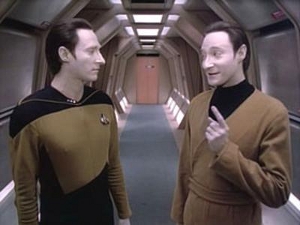I’m examining the impact Star Trek: The Next Generation had on my formation. The introduction to this series can be seen here.
When the Enterprise visits the colony where Data was originally discovered, they learn about his creator… and meet his twin brother Lore.
“Datalore” is what I think of as old school science fiction done well. It has broadly evil and noble characters, each with indicative lighting styles to inform us, the audience, of their intentions. It has a melodramatic yet straightforward mystery that unfolds mostly through betrayal of relationship between characters. And it has a baldly ambitious villain, with intentions hidden from almost everyone (and who tends toward speeches about his greatness and his dastardly plans). All of this is done with a deft hand though: good pacing, good acting, and a quality script. The only thing missing is theramin music.
 Also typical for sci-fi, it has layers of social commentary built in to the story. Data’s colleagues struggle with embarrassment and feelings of intrusion in asking questions about his differentness as an android, trying to understand Lore and how he should be treated. Even Picard, who is the first to ease the discomfort by talking about similarities they all share, still fumbles with what pronouns are most appropriate for Lore. These are everyday experiences for many members of groups seen as different and misunderstood in our culture. But, even though Data’s differences are focused on here, there is still another character less seen and with less power than he. The character chosen by the writers to see Lore’s deception before anyone else does is Wesley… who, as I mentioned earlier, is easiest to dismiss, so he’s a logical choice. Unfortunately, the situation did nothing to endear him to his detractors. The treatment he receives is a classic, crazymaking denial of reality (including the now famous rounds of “Shut up Wesley!” from multiple authority figures), which reinforces my feelings that he’s arguably the “queerest” and most marginalized person in the crew.
Also typical for sci-fi, it has layers of social commentary built in to the story. Data’s colleagues struggle with embarrassment and feelings of intrusion in asking questions about his differentness as an android, trying to understand Lore and how he should be treated. Even Picard, who is the first to ease the discomfort by talking about similarities they all share, still fumbles with what pronouns are most appropriate for Lore. These are everyday experiences for many members of groups seen as different and misunderstood in our culture. But, even though Data’s differences are focused on here, there is still another character less seen and with less power than he. The character chosen by the writers to see Lore’s deception before anyone else does is Wesley… who, as I mentioned earlier, is easiest to dismiss, so he’s a logical choice. Unfortunately, the situation did nothing to endear him to his detractors. The treatment he receives is a classic, crazymaking denial of reality (including the now famous rounds of “Shut up Wesley!” from multiple authority figures), which reinforces my feelings that he’s arguably the “queerest” and most marginalized person in the crew.
I’m sure finding out that Data has a mentally unstable family member only made me feel closer to him. And themes of differentness and visibility/invisibility were and are compelling. But mostly, this is another episode of general bonding to a quality show, at any and every age I’ve been.
Leave a Reply